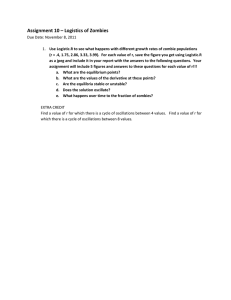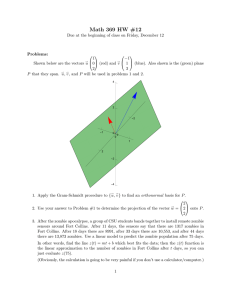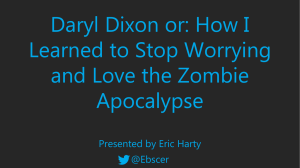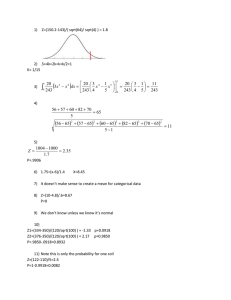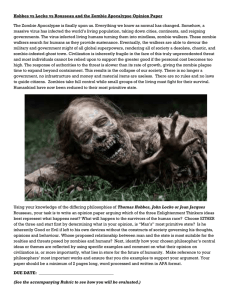World War Z
advertisement
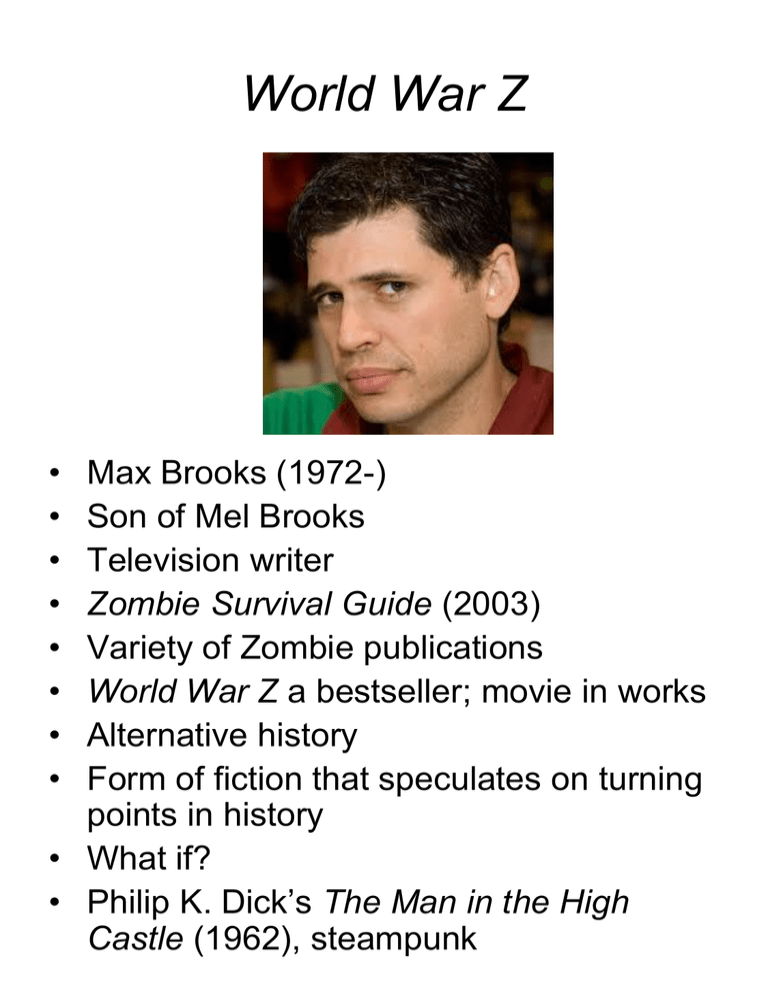
World War Z • • • • • • • • Max Brooks (1972-) Son of Mel Brooks Television writer Zombie Survival Guide (2003) Variety of Zombie publications World War Z a bestseller; movie in works Alternative history Form of fiction that speculates on turning points in history • What if? • Philip K. Dick’s The Man in the High Castle (1962), steampunk Oral history • Recording of individual voices to preserve historical record • Popularized by folklorists • Huge growth since 1970s • Portable recording equipment • Distrust of official narratives • Voice of common people • Mark Baker, Nam (1981) • Studs Terkel, The Good War (1985) • Problems: • Lack of coherence, narrative • Bias through selection • Shaped around wars: • hostilities • training • combat • return to peace • World War Z an alternate oral history • “voices” from fictional war Zombies • • • • From Haiti Syncretic religion Vodou / Voodoo Dead reanimated as slaves UBC prof. Wade Davis’ The Serpent and the Rainbow (1985) • William Seabrook (1884-1945) popularized: The Magic Island (1929) • U.S. military in Haiti • Play, then movie: White Zombie (1932) • http://www.youtube.com/watch?v=sCzhaQuXmbU • Zombies of Mora Tau (1957) • contagion • Night of the Living Dead, George Romero (1968) • Cannibalism and contagion • Inspiration: I Am Legend • Poor initial reviews • Inadvertently political & subversive • http://www.youtube.com/watch?v=5gUKvmOEGCU Spread of zombies • Romero sequels: • Dawn of the Dead, Day of the Dead, Land of the Dead, Diary of the Dead, Survival of the Dead • Remakes, imitations, and new zombie films: over 200 • Zombie books: More zombies…. Graphic novels: Games: Even more… Television Public events Why the popularity? • • • • • • • • • • • • • • • • 1920-30s: exoticism and occult 1960s: space, racial worries 2000s? Zombies: mindless, slow, infectious dangerous in mass numbers can be your relatives 1) Infection SARS, avian flu, HIV/AIDS Virus phobia 2) Disconnect Alienated, isolated people Plugged-in, non-communicating 3) Mass polarization Us vs them Breakdown of dialogue 4) Overwhelming nature of contemporary life • Communication • Schedules Introduction • Fictional background to “history” • United Nation’s Postwar Commission Report • Alternate history: VA and VC day (2) • “resurgent economy and universal health care” (2) • 3 pretext of narrator neutrality • “a book of memories” • Early fiction presented as true • Robinson Crusoe, etc. • Even fantastic works: Gulliver’s Travels Pretext of verisimilitude • • • • • • • • • • • • • • • • Devices: apparently random voices geographic variety age/occupation variety prefatory material before interviews personal experiences of war First: initial outbreak, “patient zero” Chongqing, Federation of China Dr. Kwang Jingshu -- fictional medical doctor as authority figure war veteran (10) Three Gorges Dam – real (2006) Reallocation of 1.24m residents Dachang – fictional So WWZ begins just after 2006 10ff superstition vs medical science vs government response • Why China? • American fear; population; secrecy • Arrest of Jingshu (11) Politics • • • • • • • • • • • • • • • • • Second entry: Tibet Conflict with China “world’s most populous city” (12) Celebration of free election People smuggling economic refugees replaced by plague refugees Flight 575 Economic corruption (16) Refusal to release loved ones Third entry: first Western perspective Canadian! now in a monastery battle scene investigated zombie attack not substantiated (20) Fourth: medical explanations viral infection black market organs from China (27) in Brazil No real explanation • • • • • • • • • • • • Where is the virus from? Night of the Living Dead: space? Government lies: rabies More politics: China/Tibet, Israel/Palestine 32ff Israeli spy Jurgen Warmbrunn hears stories: golem (33) information gathering (35) Warmbrunn- Knight Report ignored, too incredible, too Israeli 36ff “Zionist lie” Israeli retreat from West Bank Collapse of politics • 41 infection line • 43 into war: preconceptions vs new reality • 44 ironic ending • Blame and denial • 73 feral girl’s story • a “recording” • 79 little Russian girl • authoritarian reprisal • 82 decimation • The Great Panic • 68-9 cars as death traps (The Road) • Comparison to Russia • Collapse of American society 63ff • Suburban smugness shattered • New suburbs of safety 64 • Slightly altered world . . . • Sigmund Freud (1856-1939) – Das Unheimliche, the uncanny Masahiro Mori’s uncanny valley Chaos vs novel structure • • • • • • • • • • • • • • • • • • • Series of accounts shaped by war “Random” witnesses and geography Characters repeat: 335 Kwang Jingshu 54 Breck Scott – entrepreneur – 337 76ff Maria Zhuganova, 329 Patterns emerge: 1) Oppressed isolated countries triumph Tibet Cuba 228ff (230) 266 zombies as justice 2) Need for adaptation weapons techniques 3) Reversal of social order 83ff reality TV compound 140ff uselessness of professions 4) emergence of heroes unconventional • • • • • • • • • • • • • • • • • • • Heroes 233ff Captain Chen rejects government decrees attacks his own country 254 Tomanga Ijiro 216ff blinded in WW2, marginalization (218) “kami” (222) conversion of Kondo Tatsumi, “otaku” “Hikikomori” Captain Christine Eliopolis WW2 “behind the lines” story failure of air force “Mets” Terry Know, astronaut (255ff) witness: Three Gorges Dam (261) Todd Wainto, American infantryman “grunt” 94 General Raj-Singh self-sacrifice, 134ff Paul Redeker, rational evil? 109 Military turning points • Battle of Yonkers, 92ff • parallels Vietnam conflict • Tet Offensive (1968) • “Charlie” becomes “Zach” • incompetence of leaders (94) • media displays (95) • reliance on technology • 103-4 failure • Battle of Hope, 273ff • abandon technology (274) • psychological fitness (275) Everyday American as hero • • • • • • • • • • • • • • • • • • Versus zombies loss of individuality herd instinct Americans as consumers identity defined by purchases subversion marketed no opportunities for distinction Mass media vs. individual experience: Radio Free Earth, 194ff Roy Elliot films, 159ff Revisionist histories: underwater battles 298ff underground battles 309ff dog battles 282ff The whole point of oral history Last voice: Todd Wainto Song “I was only nineteen” Vietnam War Summary • Popularity of zombie apocalypse scenarios: • reaction to deadening, isolating culture • eagerness for “alive” moments • desire to escape conformity • desire to escape consumerism • Combines with fear of • infection • invasion • disconnection • sense of being overwhelmed • the uncanny
